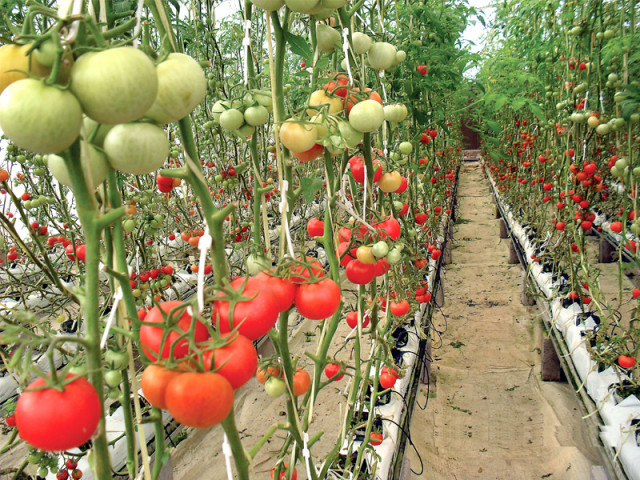High-tech agriculture: The extraordinary profits of hydroponic vegetable farming
How one company in Faisalabad is reaping the rewards of investing in research and productivity increases.

High-tech agriculture: The extraordinary profits of hydroponic vegetable farming
Tahir Rana is a nuclear physicist who gave up a job in Canada to set up a vegetable farm in Faisalabad. He is part of a growing number of people worldwide who have been drawn in by the extraordinary profits in hydroponic vegetable farming, a new method that dramatically increases productivity and thus farmer incomes.
Hydroponic farms are unique in that they do not require any fertile soil. Indeed many of the world’s largest hydroponic farms are set up in the deserts of the Middle East or unfertile soils in other parts of the world. Seeds are placed in a growing medium – which can be either solid or liquid – in trays made from steel pipes. The advantage of this system is that nearly all of the nutrients poured into the growing medium are absorbed by the plant, making it exponentially more efficient and increasing productivity manifold.
Rana has set a up a small company just outside Faisalabad called Fareed Farmhouse, where he produces three varieties of tomato (cherry tomato, strawberry tomato, beef tomato), cucumber and capsicum. His production capacity is significantly above the norm.
“Through this technique, farmers can get between 450 and 550 tons of vegetables per acre, compared to the average yield of 15 tons per acre using traditional farming,” said Rana Zahid, the project director at Fareed Farmhouse.
Rana uses coconut waste imported from Sri Lanka as the solid medium in which he grows his plants. The vegetable plants are then irrigated through a water injection system. Fareed Farm uses reverse osmosis water purification systems to ensure the quality of the water.
Each plant requires up to two litres of water per day, which needs to be slightly acidic, with a pH of 5.8, according to Zahid.
Fareed Farmhouse produces relatively high-end vegetables that are consumed by higher income customers. His buyers include some of the large retail and wholesale chains in the country as well as hotels that have traditionally imported many of these vegetables from Europe.
Rana sells the tomatoes for about Rs225 per kilogram, compared to the cost of importing them from the Netherlands, which can run as high as Rs800 per kilogram. The seeds for the tomatoes at Fareed Farmhouse are imported from Canada and many of the other raw materials from China and Sri Lanka. Yet while the imported raw materials can be expensive, the method allows the company to save on other expenses.
“Our production method allows us to not use any kind of pesticides,” said Rana Arshad, a quality control officer at Fareed farmhouse.
The methods used by Fareed Farmhouse, however, do not come cheap. Hydroponic farming requires an investment of up to Rs1.5 million per acre, though it can yield net profits of up to Rs3 million per acre annually. Tahir Rana, however, is not content with just reaping the rewards of the existing techniques. He plans to spend up to Rs4 million in researching new methods and new variants of seeds. He is also planning on rapidly expanding his production base to up to 20 acres in the Faisalabad area.
Rana is a firm believer in the potential of hydroponic farming to transform Pakistani agriculture. “Every year, we import vegetables from India. If the government takes an interest in promoting these new technologies, we would not need to import from other countries. In fact, the country could earn a lot of foreign exchange by exporting to other countries.”
While Fareed Farmhouse is thus far focused on high-end vegetables, it appears that the company believes this method can be used to produce more mass market products as well.
Published in The Express Tribune, March 23rd, 2012.


















COMMENTS
Comments are moderated and generally will be posted if they are on-topic and not abusive.
For more information, please see our Comments FAQ